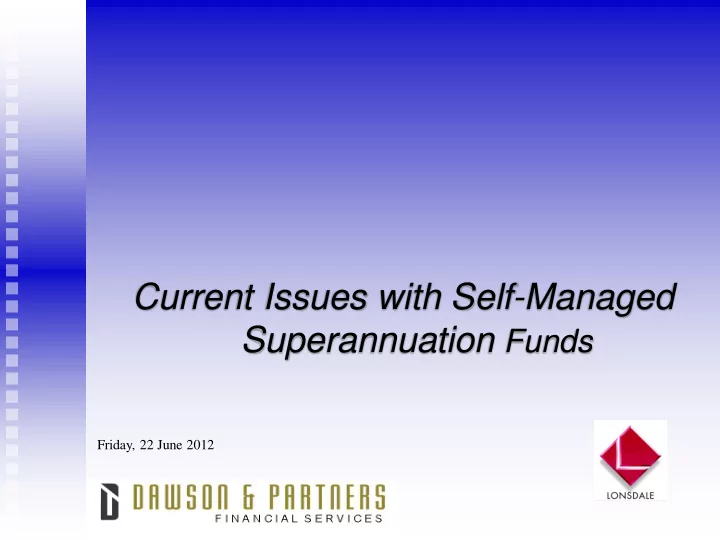

Current Issues with Self-Managed Superannuation Funds Friday, 22 June 2012
Agenda 1. The Changes: What have the Government done to us? 1. Excess Contributions Tax 2. Reduced Contribution Caps 3. Co-contributions and LISC 4. The New Surcharge 2. Superannuation Revisited: What benefits remain?
Assumption I am assuming that most of you have a SMSF, and are generally familiar with how they work. If this is not the case, please let me know….
Excess Contributions Tax Has now been with us for several years, But problems continue to surface For example………
Case Study 1 Bill is 55, and earns a good salary. He likes to put the maximum possible amount into super, and salary sacrifices to $50,000 each year
Case Study 1 In 2011, he received an inheritance of $600,000, and after some research, decides to contribute the following after tax amounts:- $150,000 in 2010/11 $450,000 in 2011/12 He is really pushing superannuation to the maximum!
Case Study 1 However, because there was one extra pay period in 2010/11, it later turns out that Bill’s employer contributions totalled $50,010 $10 over the limit.
Case Study 1: Question Under the excess contributions tax rules, roughly how much penalty tax does Bill have to pay? A. $3 B. $100 C. $2,500 D. $70,000
Case Study 1 Answer is D. – roughly $70,000 Excess concessional contributions tax in 2010/11 = $10 x 31.5% = $3.15 But extra $10 is also added to the non-concessional amount, making $150,010 for 2010/11, which triggers the 3 year limit of $450,000
Case Study 1 So when $450,000 is contributed in the following year, the total is $450,000 + $150,010 = $600,010 This is $150,010 above the $450,000 limit Excess NCC tax is $150,010 x 46.5% = $69,754 Plus $3 from previous page = $69,757!
Case Study 1 This can happen in several different ways!, e.g. Personal contributions not claimable because income is low Insurance premiums which are actually super contributions “Notional” contributions from defined benefit government funds
Case Study 1 Lessons to take away:- Keep careful records of what goes into super each year Don’t try to push it to the absolute maximum Be especially careful if using the $450,000 “bring forward” Take advice if in doubt!
Reduced Contribution Caps for over 50’s If you are 50+, you can deduct (or salary sacrifice) up to $50,000 in 2011/12, But for 2012/13, this reduces to $25,000 for everybody! There were proposed relief measures, but these are not happening, and may never happen!
Reduced Contribution Caps for over 50’s This requires prompt action if you, or your employer are making regular monthly or fortnightly contribution payments. It is only a week away! Remember the case study!
Co-Contribution and Low Income Super Contribution (LISC) In the current year (2011/12), those earning less than $61,920 can contribute extra after tax amounts to super, and receive the Government Co- contribution on a dollar for dollar basis. When adjusted taxable income is less than $31,920 up to $1,000 can be received.
Co-Contribution and Low Income Super Contribution (LISC) In the next year (2012/13), this becomes considerably less attractive:- Nothing if income is above $46,920 Contribution rate is halved to 50 cents in the dollar Maximum amount reduced to $500
Co-Contribution and Low Income Super Contribution BUT – if your income is less than $37,000, you will also get the LISC! Calculated as:- Concessional contributions x 15% On a maximum contribution amount of $3,330 ($37,000 x 9%) each year So maximum LISC = $500 Those on lower incomes, can salary sacrifice up to $3,330 and still get the full $500
Co-Contribution and Low Income Super Contribution Adjusted Taxable $25,000 $37,000 $40,000 $50,000 Income Contribution $1,000 $662 $462 $0 Required Maximum Co- $500 $331 $231 $0 Contribution LISC $338 $500 $0 $0 Total Government $838 $831 $231 $0 Contributions
The New Surcharge This was announced prior to the recent Federal budget, but there is no legislation at present Involves increase in contributions tax from 15% to 30% for people with incomes greater than $300,000
The New Surcharge It is likely that “income” will be subject to a special calculation, and will definitely include the adding back of super deductions, Fringe Benefits and Negatively geared investments may also be added back Will be difficult to avoid, so higher earners are likely to avoid super for tax planning
Case Study 2 Julia is a high income earner, who gets: Salary $265,000 p.a. Vehicle $25,000 Superannuation $25,000 Total Income for “surcharge” purposes = $315,000
Case Study 2 She exceeds $300k threshold by $15k Tax payable by her super fund will be:- Normal contributions tax $25,000 x 15% = $3,750 Plus additional tax $15,000 x 15% = $2,250 Tax payable by fund has increased from $3,750 to $6,000 (+60%)
Conclusions What has the Government done to us?
Conclusions For those earning lower incomes, not much has changed. Lower paid employees who do not contribute anything extra to super will get a handout in the form of the LISC Up to $500 p.a
Conclusions For those on middle incomes, again not much is different, Access to the Government co- contribution is now less attractive, (or unavailable if ATI > $46,920)
Conclusions But if you’re not using the co - contribution, And your income is less than $300,000 p.a., and you are regularly contributing, say $10k to $25k each year to super: It is business as usual
Conclusions If you are a high income earner:- 50+ years old and making large contributions, or Earning > $300,000 Then superannuation is not as effective at it was, in managing that income
Conclusions But for funds which are already in the superannuation system, these changes will have very little effect:- The tax rate is still 15% in accumulation, and 0% on pension accounts, Pensions are still tax-free if you are 60+ And there is a Federal Election next year!
Conclusions Superannuation still makes good sense as a vehicle for your investments!
Questions?
Recommend
More recommend